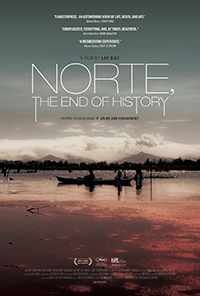Crime & Punishment: Diaz’s Latest Epic Examines the Banality of Evil
 For those accustomed to the cinema of Lav Diaz, the four hour running time of his latest opus, Norte, the End of History, seems conservatively trim by comparison. But for those uninitiated, this is an excellent place to start. Basically, Diaz’s narrative displaces Dostoevsky’s Crime & Punishment to the Philippines, further examining the moral suffering of his Raskolnikov figure by denying societal sanctioned consequences, exacerbated by the fact that another man takes the fall for his actions.
For those accustomed to the cinema of Lav Diaz, the four hour running time of his latest opus, Norte, the End of History, seems conservatively trim by comparison. But for those uninitiated, this is an excellent place to start. Basically, Diaz’s narrative displaces Dostoevsky’s Crime & Punishment to the Philippines, further examining the moral suffering of his Raskolnikov figure by denying societal sanctioned consequences, exacerbated by the fact that another man takes the fall for his actions.
Truth and meaning, the sacred and profane, society and the family—all are philosophical notions discussed figuratively and literally in the frameworks of Diaz’s latest, but not to the radical effect that this may imply. Instead, the banality of life and the dreadful, sometimes excruciating passage of time devours all.
Fabian (Sid Lucero), is an increasingly angry young man who quit law school with only a year left to go. Apathetic about his future and bitter about his lot in life, he meets regularly with old school friends that have gone to successful careers. They urge him to complete his degree, yet grow increasingly worried as his behavior becomes more erratic, his subjects of discussion more worrisome. Meanwhile, Eliza (Angeli Bayani) and her husband Joaquin (Archie Alemania) struggle to raise their two children on limited means, with Eliza constantly haggling with a callous pawnbroker that seems to have little pity for the poor people she fleeces in order to live in her own privileged fashion. Ultimately, Fabian murders the pawnbroker, but Joaquin gets convicted of the crime, leaving Eliza alone to feed her children off her earnings as a vegetable peddler.
Diaz utilizes cinematographer Lauro Rene Manda, here making his feature debut, which comes as a great surprise considering the particular visual acuity on display. There are framed visions of absolutely stunning beauty throughout Norte, the camera seemingly locked in a distant stare as it contemplates objects and people sometimes far away in its depth of field. And yet, almost imperceptibly, it will begin to move slowly forward, as if it’s a lazy eye slowly examining the scene. In the film’s last half, we get a shot of Eliza’s helper Ading (Hazel Orencio) as she props open a window, the camera capturing the bruised purple sky pressing down on the vibrancy of half lit foliage. The opposing light sources intermingle in what has to be one of the single most arresting shots you’re likely to see.
Performances, while utterly naturalistic, get usurped in the very banalities we’re guided through. Lucero’s increasingly unwinding Fabian and Alemania’s saintly Joaquin seem merely the opposing faces of the same coin. Yet, a melancholy Angeli Bayani, who turns in an equally nuanced performance in 2013’s Ilo Ilo, is certainly a standout. After her husband’s first and only visit with his children after being falsely convicted of double homicide, her tear stained face morphs through a cascade of emotions, leading her to the literal brink of immutable tragedy.
Many exchanges of dialogue revolve around philosophical topics that lend Norte a rather novelized air, and Fabian, like Raskolnikov, finds himself above the law as written by man, too good to play by their rules yet degraded by the fact that money must be obtained for survival. Religion is also tellingly impaled here, Christianity a threadbare veil used to disappear into as a coping mechanism, first as a trap that sees the despairing Fabian almost confess his crime, and then, more horrifically, through the somber caricature of his staunchly religious sister, with whom transpires the film’s second most disturbing sequence. Family, a microcosm for society, is the final frontier of destruction in Fabian’s bitter rampage against societal ideals (and the end of one’s family line is the potential end to one’s ‘history’)
Despite the level of commitment demanded by its running time alone, Norte, the End of History is never dull, even if pair of sequences featuring a supposed spirit swooping over hill and dale feel a touch out of place. Superbly shot and featuring a host of interesting characters, it echoes a type of intelligent, painstaking cinema from a bygone era.
★★★★/☆☆☆☆☆


